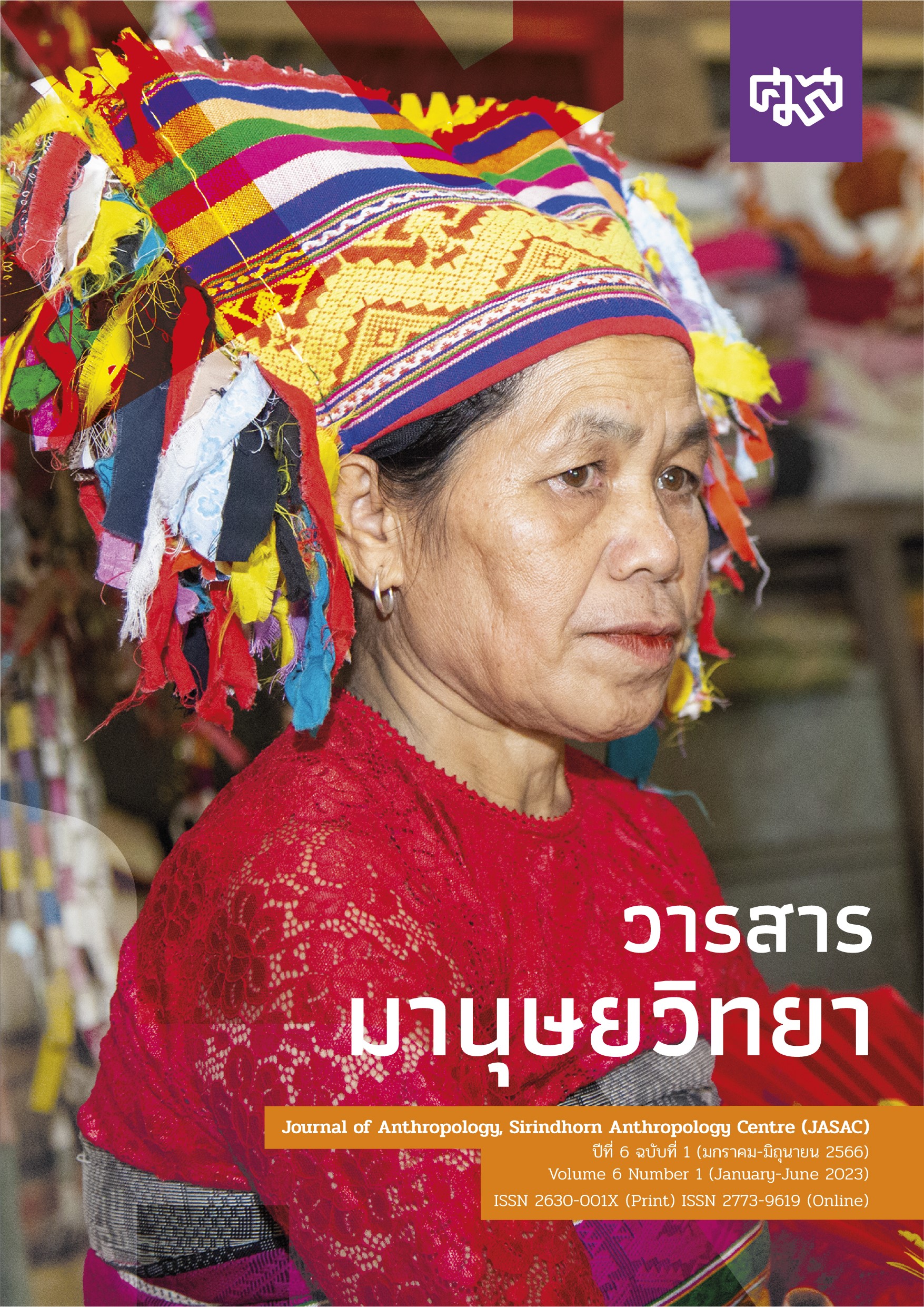รากฐานและกระบวนทัศน์การวิจัยเพื่อท้องถิ่น กับการเปลี่ยนแปลงทางสังคม
Main Article Content
บทคัดย่อ
บทความวิชาการนี้นำเสนอรากฐานและกระบวนทัศน์การวิจัยเพื่อ
ท้องถิ่นกับการเปลี่ยนแปลงทางสังคม ซึ่งการวิจัยเพื่อท้องถิ่นถูกจัดอยู่ในกระบวนทัศน์วิพากษ์ ให้ความสำคัญกับวิภาษวิธีและการเสวนา มีเป้าหมายเพื่อแสวงหาความรู้เพื่อการปลดปล่อย มนุษย์มีอิสระจากการครอบงำ สร้างความเท่าเทียม เพื่อให้เกิดการเปลี่ยนแปลงทางสังคม การวิจัยเพื่อท้องถิ่น(CBR) ได้รับอิทธิพลจากการเคลื่อนไหวทางสังคมในทศวรรษ 1960 และ 1970 ที่ค้นหาสังคมที่ยุติธรรมและปลดปล่อยผู้ถูกกดขี่ในแอฟริกา เอเชีย และละตินอเมริกา สำหรับการวิจัยเพื่อท้องถิ่น นั้นมุ่งเน้นการทำงานกับผู้ด้อยโอกาสผู้ถูกกดขี่ในด้านต่าง ๆ เช่น ทางเพศ สีผิว เชื้อชาติ ชนเผ่าพื้นเมือง ประชาชนพื้นที่ชนบท เป็นต้น มีหลักการ 4 ประการ คือ 1) โจทย์วิจัยมาจากชุมชน 2) ชุมชนเป็นนักวิจัย 3) ปฏิบัติการแก้ไขปัญหาร่วมกัน และ 4) สร้างเครือข่ายความร่วมมือสู่ผลลัพธ์ การวัดผลในเชิงการเปลี่ยนแปลงทางสังคมของการวิจัยเพื่อท้องถิ่นนั้น แบ่งออกได้ 3 ประการ คือ ระดับเล็ก (Micro) ระดักลาง
และระดับมหภาค โดยมุ่งเน้นการเพิ่มขีดความสามารถ เพิ่ประสิทธิภาพ
และการเสริมพลังให้กับชุมชน สังคม สู่เป้าหมายที่ต้องการการเปลี่ยสังคม
Article Details

อนุญาตภายใต้เงื่อนไข Creative Commons Attribution-NonCommercial-NoDerivatives 4.0 International License.
ลิขสิทธิ์@ของวารสารมานุษยวิทยา
ศูนย์มานุษยวิทยาสิรินธร (องค์การมหาชน), กรุงเทพฯ, ประเทศไทย
ข้อมูลเพิ่มเติม:
https://creativecommons.org/licenses/by-nc-nd/4.0/
เอกสารอ้างอิง
กาญจนา แก้วเทพ. (2548). การวิจัยจากจุดเริ่มต้นจนถึงจุดสุดท้าย. สํานักงานกองทุนสนับสนุนการวิจัย. กรุงเทพฯ: ชีโน ดีไชน์.
กาญจนา แก้วเทพ. (2563). การวิจัยเพื่อท้องถิ่น (CBR) กับความเหลื่อมล้ำในสังคม. กรุงเทพฯ: สํานักงานการวิจัยแห่งชาติ.
กาญจนา แก้วเทพ. (2564). ขี่ม้าเลียบค่าย บทเรียนการทํางานกับภาคีของงานวิจัยเพื่อท้องถิ่น. เชียงใหม่: วนิดาการพิมพ์.
กาญจนา แก้วเทพ. นักวิชาการวิจัยเพื่อท้องถิ่นและเมธีวิจัยอาวุโส สกว. สัมภาษณ์. 1 กันยายน 2565.
พิชาย รัตนดิลก ณ ภูเก็ต.(2559). ปรัชญาสังคมศาสตร์: การอธิบายทางสังคมรากฐานสําหรับการวิจัยทางสังคมศาสตร์. พิมพ์ครั้งที่ 2. กรุงเทพฯ: บางกอกบล็อก.
พิเชฐ สายพันธ์. (2564). ทฤษฎีวิพากษ์เชื้อชาติ (Critical Race Theory) และการกลับมาของปัญหาอคติการเหยียดเชื้อชาติ. วารสารมานุษยวิทยา, 4(2), 252-260
วรรณดี สุทธินธากร. (2560). การเรียนรู้เพื่อการเปลี่ยนแปลงและการวิจัยเชิงปฏิบัติการ. กรุงเทพฯ: สยามปริทัศน์.
สํานักงานกองทุนสนับสนุนการวิจัย (สกว.) สํานักงานภาค. (2548). กระบวนทัศน์วิจัยเพื่อท้องถิ่นจุดเปลี่ยนการพัฒนา, การประชุมงานวิจัยเพื่อท้องถิ่น. เชียงใหม่: วนิดาการพิมพ์.
สินธุ์ สโรบล. (2552). วิธีวิทยาวิจัยเพื่อการเปลี่ยนแปลงและพัฒนาชุมชน: บทสังเคราะห์ งานวิจัยเพื่อท้องถิ่นในประเทศไทยและประสบการณ์จากต่างประเทศ. สํานักงานกองทุน สนับสนุนการวิจัย (สกว.) ฝ่ายวิจัยเพื่อท้องถิ่น. กรุงเทพฯ: วนิดาการพิมพ์.
อานันท์ กาญจนพันธุ์. (2544). มิติชุมชน: วิธีคิดท้องถิ่นว่าด้วยสิทธิ อํานาจและการจัดการทรัพยากร. กรุงเทพฯ: สํานักงานกองทุนสนับสนุนการวิจัย (สกว.).
อุทิศ ทาหอม. (2561). การพัฒนาแบบยั่งยืน. บุรีรัมย์: มหาวิทยาลัยราชภัฏบุรีรัมย์.
อุทิศ ทาหอม. สันติภาพ ชารัมย์. สุจิตรา ยางนอก. และเขมิกา อารมณ์. (2562).รูปแบบการพัฒนาศักยภาพทุนทางวัฒนธรรม เพื่อรองรับการท่องเที่ยวชุมชนอย่างยั่งยืนบ้านห้วยหวายพัฒนา ตําบลโคกสะอาด อําเภอลําปลายมาศ จังหวัดบุรีรัมย์. ได้รับงบประมาณสนับสนุนจากสํานักงานคณะกรรมการส่งเสริมวิทยาศาสตร์ วิจัยและนวัตกรรม (สกสว.).
อุทิศ ทาหอม และคณะ. (2564). รูปแบบการพัฒนาขีดความสามารถด้านการท่องเที่ยวชุมชน เพื่อลดความเหลื่อมล้ำทางสังคมตําบลบึงเจริญ อําเภอบ้านกรวด จังหวัดบุรีรัมย์: กรณีศึกษา ชุมชมสายตรีพัฒนา 3และชุมชนสายตรี 7. ได้รับงบประมาณสนับสนุนจากสํานักงานการวิจัยแห่งชาติ (วช.).
Chevalier, J. M., & Buckles, D. J. (2019). Participatory Action Research:Theory and Methods for Engaged Inquiry. London: Routledge.
Hall, B. L. (1992). From Margins to Center? The Development and Purpose of Participatory Research. The American Sociologist, 23(4), 15-28.
Holkup, P. A., Tripp-Reimer, T., Salois, E. M., & Weinert, C. (2004).Community-Based Participatory Research: an Approach to Intervention Research with a Native American Community. ANS. Advances in nursing science, 27(3), 162.
Israel, B. A., Eng, E., Schulz, A. J., & Parker, E. A. (2005). Introduction to Methods in Community-Based Participatory Research for Health. Methods in Community-Based Participatory Research for Health, 3, 26.
srael, B. A., Schulz, A. J., Parker, E. A., Becker, A. B., Allen, A. J.,Guzman, J. R., & Lichtenstein, R. (2017). Critical Issues in Developing and Following CBPR Principles. Community-Based Participatory Research for Health. Advancing social and health equity, 3, 32-35.
Jason, L., & Glenwick, D. (Eds.). (2016). Handbook of Methodological Approaches to Community-Based Research: Qualitative, Quantitative, and Mixed Methods. New York, NY: Oxford university press.
Leavy, P. (2017). Research Design: Quantitative, Qualitative, Mixed Methods, Arts-Based, and Community-Based Participatory Research Approaches. New York, NY: Guilford Publications.
Minkler, M., & Wallerstein, N. (Eds.). (2011). Community-Based Participatory Research for Health: From process to outcomes.John Wiley & Sons.
Roche, B. (2008). New Directions in Community-Based Research. Wellesley Institute.
Thompson, V. S., & Hood, S. (2017). Community-Based ParticipatoryResearch. In Public Health Research Methods for Partnerships and Practice (pp. 1-22). London: Routledge.
Taylor, S. M., & Ochocka, J. (2017). Advancing Community-Based Research in Canada. International Journal of Knowledge-Based Development, 8(2), 183-200.
Tobias, J. K., Richmond, C. A., & Luginaah, I. (2013). Community-Based Participatory Research (CBPR) with Indigenous Communities: Producing Respectful and Reciprocal Research. Journal of Empirical Research on Human Research Ethics, 8(2), 129-140.
Strand, K. J. (2000). Community-Based Research as Pedagogy.Michigan Journal of Community Service Learning, 7(1). 85-96
Stoecker, R. (2003). Community-Based research: From Practice to Theory and Back Again. Michigan Journal of Community Service Learning, 9(2). 35-46.
Viswanathan, M., Ammerman, A., Eng, E., Garlehner, G., Lohr, K.N., Griffith, D., & Whitener, L. (2004). Community-Based Participatory Research: Assessing the Evidence: Summary. AHRQ Evidence Report Summaries.
Wallerstein, N. B., & Duran, B. (2006). Using Community-Based Participatory Research to Address Health Disparities. Health Promotion Practice, 7(3), 312-323.
Wallerstein, N., Duran, B., Oetzel, J. G., & Minkler, M. (2017). On Community-Based Participatory Research. Community-Based Participatory Research for Health: Advancing Social and Health Equity, 3, 3-16.
Wallerstein, N., & Duran, B. (2017). The Theoretical, Historical and Practice Roots of CBPR. Community-Based Participatory Research for Health: Advancing Social and Health Equity,7-29.
Wilson, E. (2019). Community-Based Participatory Action Research. Handbook of Research Methods in Health Social Sciences. (pp. 285-298). Springer Singapore.
Zimmerman, S., Tilly, J., Cohen, L., & Love, K. (2009). A manual for Community-Based Participatory Research: Using Research to Improve Practice and Inform Policy in Assisted Living. CEAL-UNC Collaborative. Chapel Hill, NC: University of North Carolina, 1-112.


